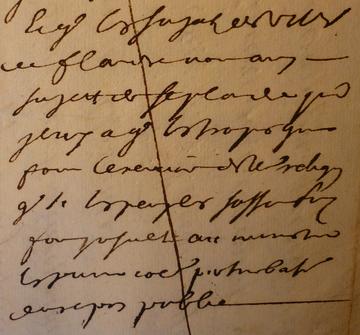An Impossible Hand

Service Historique de la Défense, Château de Vincennes (photo Scott Sowerby)
The Château de Vincennes is a suitably grand location for the French army archives, harkening back to the age of Louis XIV. The archives are located in an imposing wing of apartments built for the Sun King himself in 1661. They are defended both by the walls of the château and by a complicated reservation system that a reader must navigate in order to book a visit. Once you have secured a reservation, you can pre-order documents—indeed, if you are interested in looking at original manuscripts, you must order your documents in advance, as only microfilms and printed books can be ordered up on the day of your visit.
The reward for your labours, apart from a beautifully appointed salle de lecture hung with dramatic battle scenes, will be some of the richest early modern military archives available in Europe. The sheer density is staggering. Over a series of visits, I worked through some of the papers of the marquis de Louvois, who was Louis XIV’s secretary of war from 1662 to 1691, the period when the French army was making its long climb to European dominance. After reading through a dozen volumes of Louvois’s correspondence, I had only scratched the surface—a further two hundred or so remained.
Louvois was an indefatigable correspondent. He routinely wrote more than a dozen letters per day to intendants and generals across France. He also had one of the worst hands I have ever seen. A sample is provided below. It is only because this passage was transcribed by the nineteenth-century historian Camille Rousset that I know that it reads: ‘et que les sujets des villes de Flandre n’ont aucun sujet de se plaindre, quand il n’y a que les troupes qui font l’exercice de leur religion. Que si les peuples font insulte au ministre [on] les punira comme perturbateurs du repos public’. Even this master of Louvois’s handwriting left out one word—see if you can make out which it was!

Vincennes, Service historique de la Défense, GR A1 339, n° 87, Le Peletier to Louvois, 8 Aug. 1673, endorsed on verso by Louvois. Photo Scott Sowerby
The passage relates to an episode from 1673, when the bishop of Tournai wrote to Louvois complaining that some Swiss mercenaries in the French army had been holding Protestant worship services in Lille. The bishop wanted Louvois to put a stop to this, but Louvois, somewhat surprisingly, sided with the mercenaries. The minister of war was evidently more concerned about losing the services of his Swiss soldiers than he was about offending the sensibilities of local Catholics.
Without the nineteenth-century transcript, I would be lucky to make out a word here and there—a ‘sujet’ here or a ‘perturbateur’ there. Fortunately, most of Louvois’s correspondence is available in neat scribal copies. This note is an exception because the minister of war wrote it himself on the verso of a letter from Lille’s intendant reporting the problem. One can’t help but feel compassion for the man’s scribes.
Historians interested in Louvois would be well advised to begin with the magisterial four-volume Histoire de Louvois by the nineteenth-century chronicler alluded to above. Rousset, like few historians before or since, managed to read through the entirety of Louvois’s correspondence, and he is generous in his citations from the originals. There is no proper index to most of the volumes in the Louvois collection, but the Ministère de la Guerre’s indispensable Inventaire Sommaire des Archives Historiques (Archives Anciennes – Correspondance) offers glimpses of the treasures that lie within.
The value of Louvois’s correspondence lies precisely in its bulk. The secretary of war sat at the center of a vast network of informants. His subordinates consulted him about matters great and small, and in his letters back to them he ironed out the details of how complicated policies would be implemented. It is only through Louvois’s correspondence that we know the minute details of how the French army responded to Louis XIV’s revocation of the Edict of Nantes in 1685, when the Huguenots, who had heretofore served by the thousands, suddenly had to be converted en masse by order of the king. The gripping story of how the Huguenot soldiers were pressured to convert, and how those who refused to convert were subsequently treated, will be the centrepiece of one of the chapters in the book I am presently writing, Absolution and Arms: The Violent Origins of Religious Toleration in Early Modern Europe. But first, I need to finish deciphering Louvois’s handwriting.
Further reading:
Louis André, Michel le Tellier et Louvois (Paris, 1943).
André Corvisier, Louvois (Paris, 1983).
Jacques Hardré, Letters of Louvois (Chapel Hill, North Carolina, 1949).
Ministère de la Guerre, Inventaire Sommaire des Archives Historiques (Archives Anciennes – Correspondance), 7 vols. (Paris, 1898–1930).
Camille Rousset, Histoire de Louvois et de son Administration Politique et Militaire, 4 vols. (Paris, 1862–3).
Scott Sowerby @SASowerby is a Canadian-American historian and Associate Professor in the Department of History, Northwestern University.


